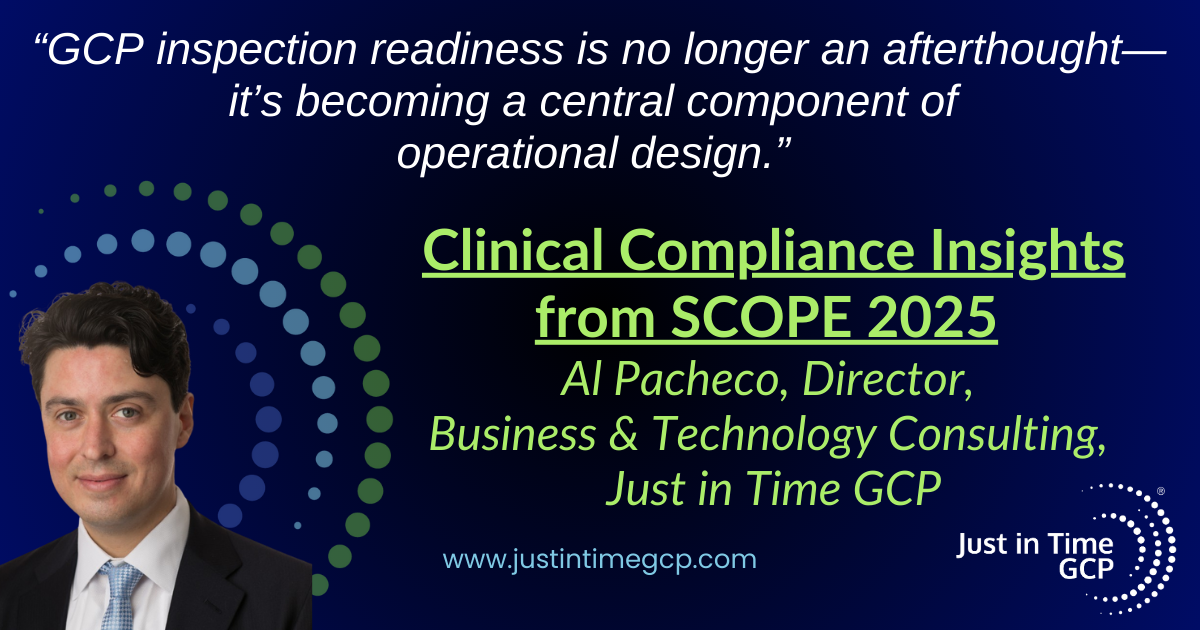Innovation, Data & Collaboration—The Formula for Progress in Clinical Compliance
Authored by Al Pacheco, Director, Business & Technology Consulting, Just in Time GCP
I was fortunate to take some time—thanks to my team at Just in Time GCP—to reflect on key takeaways from this year’s SCOPE conference in Orlando, Florida. What follows are my personal clinical compliance insights, but it’s no coincidence that this reflection reaffirmed how closely our company’s core principles align with many of the industry themes presented at the event.
Here’s the formula that continues to resonate with me:
INNOVATION + DATA + COLLABORATION = SOLVING PROBLEMS
In the world of clinical research, change is constant. As stakeholders in drug development, we must embrace innovation, leverage data effectively, and foster collaboration to navigate this evolving landscape and maintain clinical compliance.
Clinical Innovation: Beyond Buzzwords
The need for innovation has never been more urgent. It’s not just about chasing trends like AI or large language models—it’s about creating tailored operational frameworks that reflect the specific needs of each organization.
We’re seeing a shift in the regulatory environment—one that encourages adaptability over rigid, one-size-fits-all approaches. This is a game-changer for smaller biotech and medical device companies who no longer need to mimic the strategies of big pharma to succeed.
GCP inspection readiness is no longer an afterthought—it’s becoming a central component of operational design. When combined with customized QA/QC activities and a top-down culture of continual improvement, the possibilities are endless.
And yes, innovation also means leveraging technology to enable remote work, streamline processes, and improve patient engagement.

Clinical Data: The Key to Smarter Oversight
The challenge today isn’t lack of data—it’s managing data effectively.
With an ever-expanding tech ecosystem, data standardization and system integration are critical to reducing noise and driving actionable insights. Clinical compliance increasingly depends on our ability to integrate historically siloed systems and optimize data flow across teams.
From dynamic APIs to real-time dashboards, thoughtful data architecture is essential—especially when defining key metrics and KPIs from the outset.
Moreover, regulatory bodies continue to increase requests for direct system access during audits and inspections. Planning is no longer enough. The time to act is now.
Read about the benefits of Reclaiming Your Trial Master File
Clinical Collaboration: The Foundation of Real Progress
Even the most innovative solutions and insightful data are ineffective without collaboration.
Across clinical research operations, we’re seeing a welcome shift:
- Sponsors are forming cross-functional inspection readiness teams.
- Sites are adopting tools like eCOA, ePRO, EMR, and eISF to shift focus back to science and reduce administrative burdens.
- Stakeholder engagement is becoming more proactive, especially when it comes to incorporating patient voice early in development.
On the service side, there’s growing demand for operational optimization workshops and cross-functional problem-solving sessions. Bringing the right minds together to tackle the right problems—early and often—makes all the difference.
These themes were palpable at SCOPE, from early morning keynotes to evening networking sessions. Whether the topic was Risk-Based Quality Management (RBQM), vendor oversight, supply chain logistics, or the future role of AI in trials, the conversations were optimistic, forward-thinking, and grounded in a shared commitment to improving patient outcomes.
Read more from Al Pacheco in this article on Clinical Process Assessment
Final Thought: A Collective Mission
While a change of scenery in Florida was a nice bonus, it was the quality of discussions and the shared sense of purpose that made the conference experience so valuable—just like in our industry.
As personalized medicine continues to evolve, so does the need for adaptable, strategic approaches to clinical compliance and GCP inspection readiness. The regulatory landscape isn’t standing still, and neither can we.
At Just in Time GCP, this is exactly what we focus on—helping sponsors and service providers navigate complexity, close compliance gaps, and accelerate delivery of critical therapies. It’s rewarding work, and I’m proud to be part of a team that’s committed to doing it right.
Connect with Al and Follow Just in Time GCP on LinkedIn


